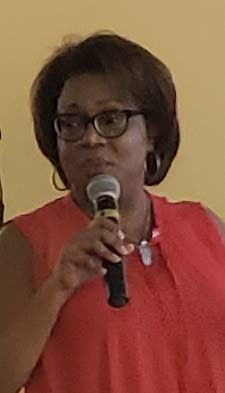[UPDATED] CTU director: Strong TT demand for sex services

COUNTER Trafficking Unit (CTU) director Alana Wheeler said research shows that there is a strong local demand for sex services compared to other Caricom nations.
She was speaking Thursday at the weekly police media briefing at the Police Administration building.
She reported that academic research conducted in Caricom over the past year suggested that "unlike most other Caricom islands, sex trafficking in TT is driven by a strong local demand for sex services." The statistics showed that 81 per cent of the demand was from locals and not foreigners.
Wheeler also announced that the CTU recently broke up a large trafficking network of minors Venezuela to Trinidad. She said some perpetrators were still being looked for but some of those involved were local officers from the ranks of inspector to constable.
Asked about local officers being involved in this trafficking network Commissioner of Police Gary Griffith replied these officers were part of a group of 75 who were being monitored "like a hawk" and there is intelligence but not enough evidence.
"In some countries that intelligence should be enough to have these officers removed. Not here. If an officer is charged for murder there will be push back by unions, by organisations, by associations who will tell me it is their right to remain as police officers and be paid. I have an issue with that."
He stressed that officers involved in these activities were a very small percentage compared to the vast majority of officers. He added that these situations make it difficult for him as commissioner.
"I am trying my best. The TT Police Service is not perfect."
He said the officers are trained to be at a higher standard and checks and balances are set to ensure there is a higher disciplinary level. He added, however, that it was difficult when there are systems where people try to tell him why he should not fire anyone or people on suspension should get full pay.
"This goes back to Minneapolis (and the officers involved in the killing of George Floyd) and don't be surprised that for some of these officers their unions will demand that they remain as police officers. I am trying to change the system here that if any police officer is charged for any violent crime – be it murder, kidnapping, rape, human trafficking – they should be fired. Because we do not want those individuals in the police service."
Wheeler in her presentation said the main types of human trafficking in TT are sexual exploitation, forced labour and domestic servitude. Sexual exploitation is the most prevalent type of human trafficking cases in TT with 85 per cent, compared to 59 per cent of global human trafficking according to a 2018 United Nations Office on Drugs and Crime report.
She also provided other facts and statistics: more than 80 per cent of victims of trafficking identified in TT are foreign nationals; businesses where victims have been exploited are bars, guest houses, massage parlours and spas, restaurants, gaming machine industry and brothels; offences found with human trafficking include rape, sexual offences, offences against the person, offences against children, proceeds of crime and offences under the Anti-Gang Act; and the majority of victims have a history of incest, sexual assault, sexual offences and other types of gender-based violence.
"Many victims of trafficking struggle with Stockholm syndrome and they blame themselves for what happened to them. They struggle with fear, intimidation, guilt, shame, and embarrassment."
Wheeler reported that traffickers use social media, online platforms and chat groups to target, isolate and groom vulnerable people.
"Once recruited, they continue to use these platforms to exploit victims of trafficking even after (they) have been rescued."
She explained the traffickers continue to send messages to threaten, harass and intimidate victims, and often discourage them from cooperating with the police and the authorities. She reported that during the covid stay at home and lockdown the increase in online and social media usage has led to more online grooming of minors.
This story has been adjusted to include additional details. See original post below.
COUNTER Trafficking Unit (CTU) director Alana Wheeler said research shows that there is a strong local demand for sex services compared to other Caricom nations.
She was speaking Thursday at the weekly police media briefing at the Police Administration building.
She reported that academic research conducted in Caricom over the past year suggested that "unlike most other Caricom islands, sex trafficking in TT is driven by a strong local demand for sex services." The statistics showed that 81 per cent of the demand was from locals and not foreigners.
Wheeler said the CTU recently broke up a large trafficking network of minors from Venezuela to Trinidad. She said some perpetrators were still being looked for but some of those involved were local officers from the ranks of inspector to constable.
She said the main types of human trafficking in TT were sexual exploitation, forced labour and domestic servitude. Sexual exploitation is the most prevalent type of human trafficking cases in TT making up 85 per cent of all human trafficking in the country. Sexual exploitation makes up 59 per cent of global human trafficking according to a 2018 United Nations Office on Drugs and Crime report.
Wheeler said, during the covid19 stay-at-home period, the increase in online and social media usage has led to more online grooming and minors.

Comments
"[UPDATED] CTU director: Strong TT demand for sex services"